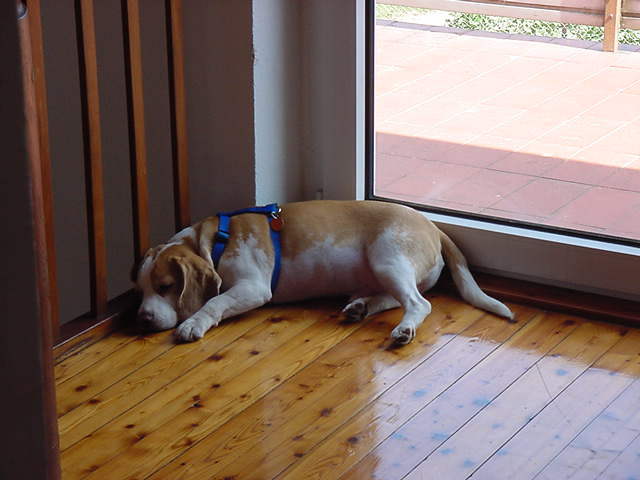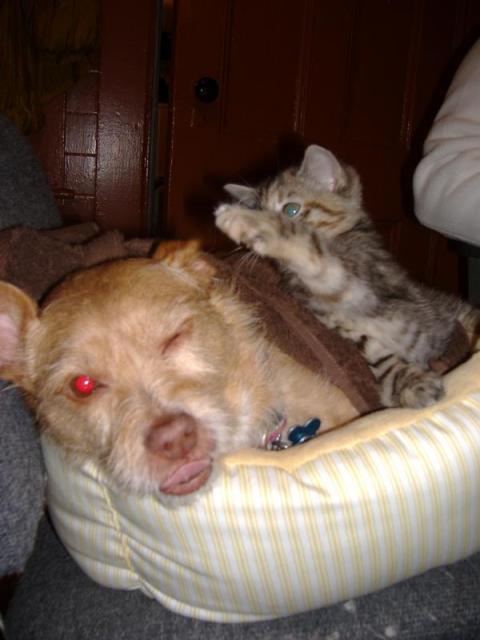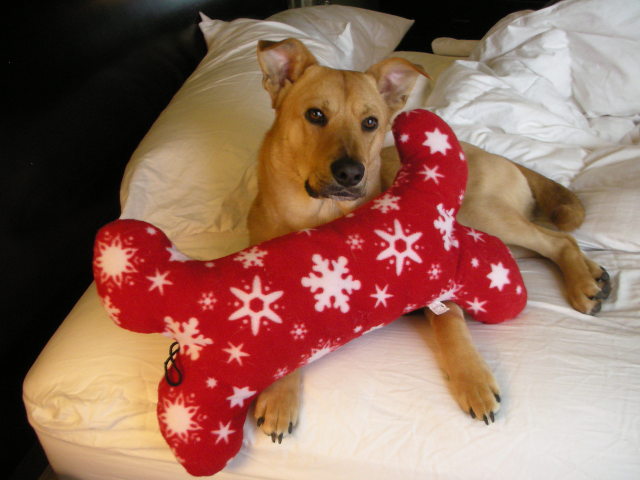QuestionHi, I have two Boarder Collie male dogs. We have owned both since puppies.Our older dog is now 7 years old and has a wonderful peaceful and obedient temperament. Earlier this year we got our second Collie at 9 weeks old. The new puppy loved our existing dog and our existing dog tolerated the constant play (joined in half the time) but truly loved walks which took on a new meaning when having a constant companion to run in circles with.
The puppy is now 8 months old and we noticed in the past two months that with his increasing size and strength ( he is now bigger and stronger than our older dog) that his play was becoming less submissive. He was suddenly not always the one on his back inviting play but becoming more dominant. Dominant but not aggressive. Our older dog stopped going out in the garden and we felt that out of responsibility to our older dog we would have the puppy castrated (our older dog is still whole) to try to ease any increasing dominant behavior.
The puppy was castrated two weeks ago and the change in our older dog is quite dramatic. He will not leave the puppy alone, trying to groom him and constantly lick his ears. He will then often try to mount the puppy. The puppy's behavior has not changed = he is still forever wanting to play with the older dog and the older dog still joins in whole heartedly.
Is this now our older dog re-exerting his dominance - sensing the change in the puppy - or as my husband puts it does he now think our puppy is a but if a girly!
Will it get worse? Should we consider having the older dog now castrated?
As I said earlier - the dominance issue prior to the castration was very vague and we had this done rather as a preventative measure to avoid it escalating.
AnswerHey, Nicola,
I hope you won't be offended if I blow your mind a little.
So here goes: there's no such thing as dominant and submissive behavior. And neutering can actually be detrimental to a dog's health, longevity, and positive social tendencies.
To help you know how to create a happy, harmonious "pack" with your dogs I think it's helpful to know that the commonly-held ideas about the nature of the pack instinct are off-base. In canids (which includes all members of the dog family: dogs, wolves, coyotes, foxes, jackals, dingos, and the wild dogs of Africa, etc.), the pack instinct only exists to facilitate the hunting instinct, particularly the hunting of large prey animals. (The only exceptions are the wild dogs of Africa, who hunt everything, including small prey, as a pack, and foxes who have no pack instinct.)
When wolves live near a garbage dump, for example, they don't form packs. Coyotes don't form packs except when they need to hunt large prey. The same goes for jackals.
Meanwhile, the domestic dog's hunting instincts have been bred for and used to suit various tasks human beings have wanted their dogs to accomplish. Some aspects of the wolf's prey drive have been suppressed by breeding in some dogs (retrievers shouldn't have a "kill bite"), and amplified in others (border collies have a very intense "eye stalk"). So all behavioral problems in dogs can be traced back to some way in which some aspect of their prey drive isn't functioning normally.
It's also helpful to know that there's no pack leader in wild wolf packs, at least not in the traditional sense. And that dominant and submissive behaviors -- which are supposedly instincts that dogs have inherited have inherited from wolves -- are based on a total misunderstanding put forward by Konrad Lorenz, a Nazi biologist who was well-respected in his time, and is still considered an icon by some people in the dog world even though most of his "scientific" ideas have proven false. The problem was his conclusions weren't based on careful observation of actual wild wolf packs, but captive packs, held in zoos and sanctuaries. (Another problem was his Nazi mindset, which made him see hierarchies where none existed.)
(You can read more about all this on my blog: http://tinyurl.com/2q2esp )
Okay, so if there's no such thing as dominance and submission, how do we explain this shift in the social dynamic between your two lovely border collies?
It's part of the natural order of puppy development that when a dog enters adolescent he starts pushing the envelope. It's also the natural order for an older dog to put the younger dog "in his place," and not let his behavior get out of hand. Looked at in this light, your pup wasn't testing your older dog's authority or trying to dominate him. He was simply testing the limits of what he could get away with in play.
Remember, the reason nature has created playfulness in animals, whether they're predators or play animals, is that it's what prepares them for adult life. Predators play games where they chase and bite one another. Prey animals do much the same thing. They're all being prepared, by genetics, to be successful, either at hunting or avoiding predators.
When it comes to play in dogs, they live something that gives them resistance, something that challenges them to reach the next level of ability, the next skill set as a predatory animal. So when your pup was playing with the older dog, and the older dog didn't exhibit the kinds of resistance the pup felt he needed in order to complete that skill set he'd been genetically engineered to try to reach, he amped up his behaviors to try to provoke the older dog to play harder, play rougher, give him more resistance.
(With me so far?)
When he was castrated, however, a lot of that instinctive juice just evaporated. He didn't have the same kind of energy he had before. So in a sense your husband is right (though it's not that the pup is now "girly," it's that he's lost some of his instinctive oomph.
As for the recent change in the older dog's behavior, I'd guess that despite his previous reluctance to play with the pup on the same level that puppy wanted to play on, he now misses that feeling of being challenged by the pup, he now misses the resistance he's not getting from the pup anymore. The mounting behavior is the clearest indicator of that to me. It's not a dominance behavior, but is often used as a way of provoking another dog into playing. It basically comes out of a frustration at not feeling that resistance that dogs like so much during play.
Personally, I wouldn't have the older dog castrated. As I said uptop, neutering can have negative effects on longevity and overall health. What I'd do instead is get both boys to play games that stimulate and satisfy the prey drive. Most border collies love to play fetch with a frisbee, so spend some time doing that with each dog individually. Tug-of-war is also an excellent game. Again, play with each dog individually for brief 5 min. periods. As you re-awaken the predatory aspect of play (chasing and biting) in each dog individually, they'll be more in alignment with their innate harmonic nature as social predators. (Excessive licking is often a substitute for play biting, by the way.) Once they're both crazy about fetch and tug individually you can try playing with them together and have them take turns, etc.
Keep taking them on long walks together. And try not to interfere as they try to work things out (for instance, I wouldn't pull the older dog off the pup when he's actively engaged in humping him--though the humping it got too out of hand I might try to lure him away with a tug toy). It sounds to me like they really love each other, and any friction or conflict between them will be temporary as long as you don't get in the way of their desire to be real pack mates, the kind that go on hunting expeditions together (which is what they "think" they're doing when out on long walks).
I hope this helps, and that I didn't blow your mind too much!
LCK

 licking the floor not stop
QuestionGeorgie
QUESTION: Hi,
I have a 7 year ol
licking the floor not stop
QuestionGeorgie
QUESTION: Hi,
I have a 7 year ol
 Post bladder surgery potty training for INDOORS!
QuestionTiki
QUESTION: Dear Dr. Connor,
My 10 ye
Post bladder surgery potty training for INDOORS!
QuestionTiki
QUESTION: Dear Dr. Connor,
My 10 ye
 My dog is shaking and hiding under my bed recently
QuestionRorrie and Pencil
QUESTION: My dog, Rorr
My dog is shaking and hiding under my bed recently
QuestionRorrie and Pencil
QUESTION: My dog, Rorr
 Very Scared Dog
Question
Happy
My dog is 17 months old and is a mixed b
Very Scared Dog
Question
Happy
My dog is 17 months old and is a mixed b
 uncontrollable beagle
Question
max
My beagle is a year and a half. Ive had hi
uncontrollable beagle
Question
max
My beagle is a year and a half. Ive had hi